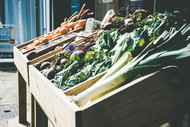How Composting Supports Sustainable Agriculture
Posted by Eco-Products on May 15th 2025
Composting isn’t just a way to reduce food waste—it’s a powerful tool that helps feed the soil, support farmers, and create healthier food systems. At Eco-Products®, we talk a lot about compostability, but what happens after compostable packaging or food scraps end up in the right bin? That’s where composting and agriculture meet.
In this article, we’ll explore how composting benefits agricultural practices, improves soil health, and helps build more resilient food systems—all while reducing our environmental footprint.
Key Takeaways
- Composting returns nutrients to the soil, improving its structure and fertility.
- Compost can reduce the need for synthetic fertilizers and chemicals.
- Healthier soil means better water retention, which boosts resilience to drought.
- Composting keeps organic waste out of landfills, where it would otherwise produce methane.
- Sustainable agriculture thrives on practices that close the loop—and composting is a supporting element of a circular economy or closed loop system.
Compost: A Natural Ally for Farmers
When food scraps and compostable packaging break down in commercial composting facilities, they become rich organic matter known as finished compost. This nutrient-dense material is a valuable soil amendment used by farmers, landscapers, and gardeners alike.
Unlike synthetic fertilizers, compost improves both the chemical and biological qualities of soil. It feeds beneficial microbes and adds organic carbon, which helps plants grow stronger and more resilient.
Healthier Soil, Healthier Crops
Healthy soil is one of the foundations of sustainable farming. When farmers apply compost to their fields, they’re not just adding nutrients—they’re building long-term soil health. That means:
- Improved soil structure: Compost enhances the ability of soil to hold moisture and resist erosion.
- More microbial activity: A thriving microbiome in the soil helps break down nutrients and suppress disease.
- Fewer chemical inputs: Compost can reduce reliance on petroleum-based fertilizers, which are energy-intensive to produce.
And when soils are healthier, crops tend to be more nutrient-dense and resilient to weather extremes.
Composting and Carbon Sequestration
Soils rich in organic matter act as carbon sinks. That means compost-amended soil can actually help pull carbon out of the atmosphere and store it underground. This process—known as carbon sequestration—is a key reason why composting plays an important role in regenerative agriculture and climate solutions.
Land that’s regularly amended with compost holds more carbon and supports plant life that draws down even more CO₂. It's a virtuous cycle, and compost is at the heart of it.
From Waste to Resource: Keeping Organics Out of Landfills
When food scraps end up in a landfill, they decompose without oxygen and generate methane—a greenhouse gas with over 80 times the warming power of CO₂ over a 20-year period. Composting diverts these materials to facilities where they break down aerobically (with oxygen), drastically reducing methane emissions.
The EPA estimates that more than 24% of landfill waste in the U.S. is food. Imagine the impact if more of that were turned into compost to feed farms instead of filling landfills.
Closing the Loop with Compostable Packaging
At Eco-Products®, we design compostable packaging that’s made from renewable resources and designed to return to the soil after use. When used in systems where food scraps and packaging are collected together—like commercial kitchens, stadiums, or universities—it becomes easier to send everything to composting facilities.
This supports Zero Waste goals and brings compost back to the farms that grow the food in the first place. It’s a circular system, not a linear one—and agriculture benefits when we treat organic “waste” as a resource.
Compost in Practice: Who’s Using It?
Farmers across the country are already seeing results from compost use. For example:
- Organic farmers use compost to meet USDA organic standards for soil fertility.
- Urban farms and community gardens rely on compost to improve poor soils.
- Large-scale conventional farms are incorporating compost to reduce fertilizer needs and improve water retention.
The key is building the infrastructure and education to support wider adoption, which is exactly why we talk about composting beyond just packaging.
Barriers to Scaling Up—and Why It’s Worth It
While the benefits are clear, challenges remain. Not every community has access to commercial composting. Some farmers may lack the resources or knowledge to source and apply compost effectively. And misconceptions about compostable packaging still exist.
But progress is happening. Policies, investments, and collaborations between composters, haulers, foodservice providers, and farmers are helping to scale composting systems that benefit everyone.
Final Thoughts
At Eco-Products®, we’re proud to support composting as part of a larger vision: healthier soils, smarter waste systems, and more sustainable food systems. Compost isn’t just a solution for packaging—it’s an investment in agriculture, climate resilience, and community well-being.
Whether you’re a foodservice operator, a compost advocate, or just curious about where your waste goes, composting offers a tangible way to help nourish both the planet and the people on it.
Let’s keep putting waste to work.
Learn More

